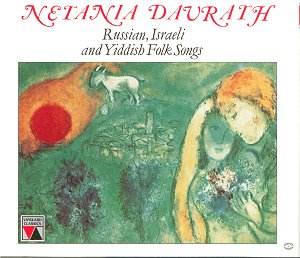NETANIA DAVRATH (1931-87)
sings RUSSIAN, YIDDISH, ISRAELI FOLKSONGS
42 songs in orchestral
arrangements
 VANGUARD CLASSICS
OVC 8058/9 [70.02+66.08]
VANGUARD CLASSICS
OVC 8058/9 [70.02+66.08]

This is somewhat outside my usual field. I was tempted into this material
by Davrath's lissom voice. She is of course the singer the prime and unmissable
collection of Canteloube songs (available in a two disc set from Vanguard).
Her voice is tender, strong, nasal, arch, shy, abandoned, free from vibrato,
pure and clean and distinctly un-operatic. She has that platinum quality
of voice that is unsophisticated and girlishly innocent. Going by track record
this is not something that can be taught. You either have it or you don't.
Davrath's facility in eight languages undoubtedly aids her interpretations
which are always intelligent and which do not give the impression of being
phonetically acquired.
There are 13 Russian songs, 15 Yiddish and 14 Israeli. The origins tie in
with the singer's life travels: born in Ukraine, moved to Caucasus, the to
Israel. There is too much territory to cover so let me single out The Birch
Tree (the theme used in Tchaikovsky 4), Moscow Nights (Dr Zhivago), Chassidic
Melody with its catchy refrain, Es Brent, a lament for scorched earth, touching
in Reizele and Viglied.
Robert deCormier is the conductor and arranger of the Russian and Yiddish
folksongs. There are various arrangers for the Israeli songs and a single
conductor Josef Leo Gruber. Some of the arrangements are less than sensitive
but then again you encounter poetic and far from obvious treatment as in
the Hinach Yafa as prepared by Y Admon. The smile in Davrath's voice is in
heart-warming evidence in Ad Shefayu'ach Yom.
The Russian songs are arranged with accordion and balalaika to the fore.
The Yiddish songs make fuller use of the orchestra which as in the case of
the peerless Canteloube set remains anonymous - presumably a pick-up band.
Perhaps someone can throw some light on the musicians involved in the NYC
and Vienna sessions?
The tracks were recorded between Nov 1959 and May 1962 in New York City and
Vienna. Davrath is intimately balanced as against the instrumentalists. Her
voice can stand this very easily.
A splendid and generous collection or all admirers of Davrath's art and the
crystal stream of folk music. Hearing these songs one is struck again by
the tragedy that Davrath did not go on to record Canteloube's voluminous
settings of folksongs from all over the world. Maria Bayo has a touch of
the Davrath in her voice and I hope that she might be tempted to filling
the aching void left by Davrath.
Reviewer
Rob Barnett

